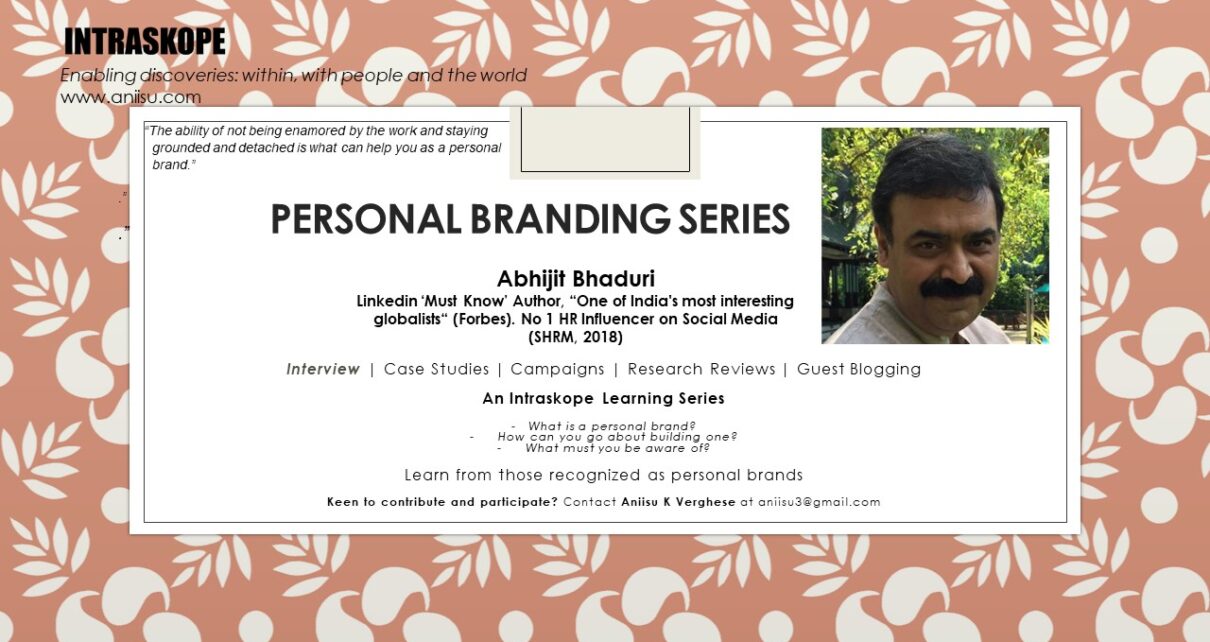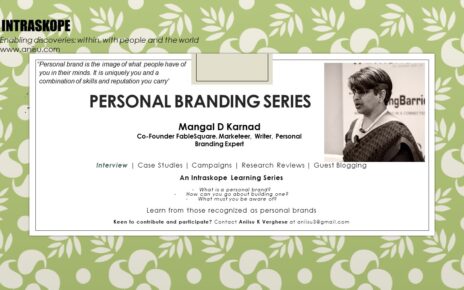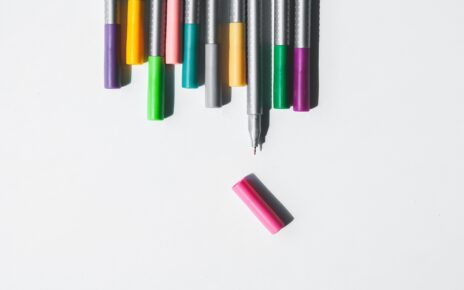Abhijit is a recognized learning and human resources thought leader, A Linkedin ‘must know’ author and consultant. Forbes called him “one of India’s most interesting globalists“(Forbes) and he was voted No. 1 HR Influencer on Social Media by SHRM in 2018.He believes in creating human connections and experimenting with different facets of the mind. Abhijit served as a guest lecturer during an Indian Institute of Management certification I did on digital marketing. His passion for connecting with people and helping them succeed was evident. I had the honor of interviewing him on personal branding. Watch this video to gain from his words of wisdom. Watch the YouTube video interview and read the complete interview below. Look up more such stories on my YouTube channel and on LinkedIn.
Questions
- What according to you is personal branding?
Personal branding is about adding value to other people. It is the emotional connection that is built. It is not transactional but more logical. When brands engage with consumers, they aim to build ambassadors and only when, regardless of the affinity, they transcend relations can they connect deeply.
2. Do you consider yourself a personal brand? How do you know it?
When you are a consultant, business goes by word of mouth. To me that is a good indicator. As a freelancer, it can also be gauged by the level of engagement people have with the content you post. For example, when they ask for something when you don’t post, they ask what happened. For someone who has nothing to gain or lose, it is an acid test.
3. What does one do to go about building a personal brand?
There wasn’t a strategy that I followed. I am not a marketing person so didn’t have a framework. I did what I really enjoyed – writing and drawing. I began using them in my work. When I taught at XLRI, I drew on slides. Then when I started blogging and used social media (Gautam Ghosh introduced me to it). I would say the attempt was mediocre. Didn’t know what it meant to create my brand. I used Blogspot to share my thoughts and a publisher noted it and invited me to pen a book. The more content you create and experiment, the more confident you get. I used to post every week. Began to illustrate the posts, since text was boring. I added photos and voice clips, made podcasts, sketched notes and it evolved. Tried different platforms including Instagram. It depends on which platforms enables you. You juggle different formats, but it is people who shape your brand. If I wrote on Sports it would not be accepted!
4. What are the attributes of a personal brand? And what do people associate your brand with?
I tried different things – various formats of writing, fiction and non-fiction. I am writing a sequel to a work of fiction, a non-fiction book called Dreamers & Unicorns which is expected this year. There isn’t a framework I used. I learnt how to use video and Instagram. So many things don’t work out.
5. Based on your observations and learning who according to you is a personal brand? What characteristics do you admire about them?
Personal branding means different things for different people. My characters in the fictional books are triggered by different people and experiences. Something about the way they talk. Finally, it is about being human. I learnt a lot from my parents, grand parents and teachers. I learnt Bengali literature and from Satyajit Ray’s movies and music. Sunil Gangopadhay was an influence due to his poetry and prose. Therefore, my learning has been multi-dimension. Each time you shift, you activate a specific part of the brain related to that area.
6. What steps did you take to build your brand?
I built trust and always strived to connect with people. Secondly, I aimed to be consistent with my values, the 2 or 3 I cared about. Thirdly, you need to be authentically you. Otherwise, it is hard to sustain which is not core to you.
7. How do you know it is working? What challenges did you face while building a personal brand? What techniques did you use?
It is fascinating to have different dimensions to your personal brand. Moving from one field to the other allowed me to stay engaged. One of the challenges is while reinventing. When you walk away from one area and get into another, you start as a novice. You are unable to replicate that you did earlier. You need to learn the grammar in each field. The second point is about building expertise. You need to bring in your own style. There is a stage where you learn from others – learn the rules and then reinvent. Many of artists like Salvador Dali for example, evolved to a contemporary style because they understood the grammar.
8. What did you gain in the process? What did you lose?
I gained from the experience of learning, which is fulfilling. If I want to learn about photography, I can learn from experts. It will improve my work although I may never be in their league. That for me is important as I continue making a better version of myself. This applied in every relationship. Discovering your own identity is the learning I gained. I learnt from my managers, my colleagues, the people I coached. It challenged the foundation I had. Human beings are the byproduct of their experiences. When you pursue many things, it is a choice. You may lose out on other aspects. I would advise that one should stay focused. Gain from breadth and depth, the divergent aspects by doing different engagements like writing books, in my case. When you converge your choices, you are bound to give up many things. I also believe, the depth of relations with a few people matter – be it your family, college mates or friends.
9. How can someone starting from scratch build a personal brand? What is the first step he or she must take?
It is a bit like your career choices – do what really works for you. It must be what you are. You need to be aware of your strengths and weaknesses. I get distracted often and also helped me try out many things. Be comfortable with what you mean to yourself – that is the essence of the personal brand. The format is irrelevant. Your work, writing, friendship, charity and dreams among others, makes you the brand you are.
10. If you had the opportunity to change something about the way you built your personal brand, what would that be?
I think life has its own flow. We always think of changing what didn’t work out. You change the combinations of what has worked out as well. Life offers a continual evolving paradigm. What I would like to change in the future and how the future unfolds is about being adaptable. Do what it takes to be adaptable. In my case, I feel I should have started focusing on health and fitness earlier.
11. What is your recipe for personal branding success?
As a philosophy, what I fall back on is the concept that ‘this too shall pass’.
When things seem bad, as will the good things happen, keep that in mind. It keeps you sane and focused on giving my best. When I write a blog post, there will always be things you can improve in your writing. The ability of not being enamored by the work and staying grounded and detached is what can help you as a personal brand. When you can’t, it prevents you from improving what you do. Build resilience from the fact that ratio of failures is more than successes. I shrug if it didn’t work out. You need to be clinical and not break down. It is about bouncing back.
12. With COVID19 and other crises what steps can personal brands take?
I would say that this is a time which is difficult for everyone. If you have some way to be of value, you should help. Personal brands who are really doing are those who offered their courses online – free and removed pay wall. Some have made the concerts online. This situation is about joining hands and going through together. Think of ways of what you can do and capable of contributing – be it money, time, ideas or vaccine. In this process the brand will get defined. It is a short window of opportunity and the true self comes through.
13. What’s your advice for youngsters about building personal brands?
Because this generation has grown-up with smart phones, the grammar of technology is already clear to them. One half is about connecting the other is about what is perennial and what is transient. It is not about viral content or something which is not concrete. For example, at one point, Kolavari Di was the song of the year. Who talks of it today? Each post bubbles up and surfaces to a certain extent. Understand deeper human needs. Some understand it as online and some as offline conversations. Building a personal brand is a lifetime journey. It is about how you change yourself by understanding others. How you can adapt to the world. Adapt to technology and build human connections, is my advice.
Liked this interview? Please do share your feedback and comments.
Keen to get ahead with your personal brand? Here are some resources:
- Take a FREE assessment on personal branding.
- Refer to the 3C model on Personal Branding
- Sign up for a 60-minute personalized chat on personal branding
- Personal branding for corporate communicators
- 6Ps of Personal Branding during COVID-19 (my article in Business World)
Missed the earlier episodes? Read the interviews with Muqbil Ahmar, Tinu Cherian Abraham, Joseph Fernandez, Christina Daniels, Karthik Srinivasan, Gautam Ghosh, Alexander Michael Gittens, Mubeen Azeez, Itzik Amiel and Mangal D Karnad online and share your thoughts.
Keen to join this Series and share your thoughts on Personal Branding? Write to me at [email protected]
Please subscribe to my YouTube Channel and follow me on Medium.



